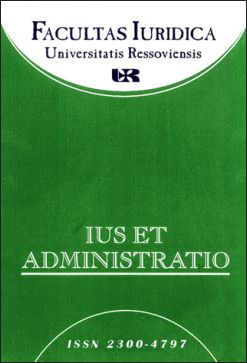Tasks of local self-government units in the field of health security - theoretical and practical aspects
Keywords:
health security, healthcare, local self-government, public tasks, health policy programsAbstract
The article contains an analysis of the chosen administrative law regulations regarding the tasks of local self-government units in the field of healthcare that influence the level of health security. It also shows the so-called practical aspects of the realization of these tasks by the local self-government. Healthcare security is one of the elements affecting the internal security of the state and the job of the state is to create an appropriate level of healthcare provisions which allows for the realization of the constitutional right to healthcare. It is also the state’s obligation to organize the structure of public administration in such a way that the public tasks are performed in an efficient and effective manner. For this purpose, some of the tasks are entrusted to the implementation of a government administration, while others are given to the local government administration. The practice suggests that healthcare policy programs, realized by the local self-government should be characterized by high efficiency. However, it turns out that knowledge on how to develop a correct and good health care policy program is not common. Statistical data published by the Agency for the Evaluation of Medical Technology and Tariffs shows that still, a large number of projects of health programs submitted for evaluation by this agency does not receive a positive opinion as activities related to the development and implementation of programs in this field are often chaotic and ad hoc. This indicates the need to provide broad and diverse support for people preparing health policy programs in individual local self-government units.
Downloads
Downloads
Published
How to Cite
Issue
Section
License
Copyright (c) 2018 Ius et Administratio

This work is licensed under a Creative Commons Attribution-NonCommercial-NoDerivatives 4.0 International License.

